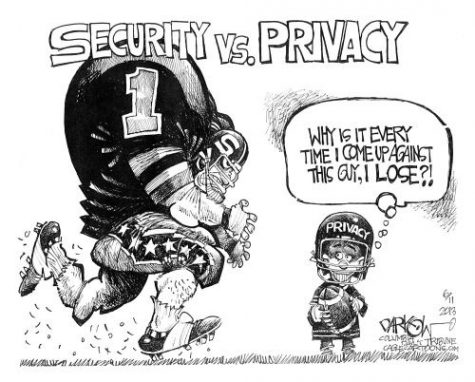The True Cost of National Security: Our Privacy Online
 Civil liberties and individual rights have long been prized possessions of the American people, from the formation of the U.S. Constitution to the ratification of the 19th amendment. While this ideology hasn’t changed throughout multiple centuries, the mediums in which we express ourselves have dramatically, and the rise of the Internet Age has given way to even more areas in which the lines between privacy and security are continually blurred.
Civil liberties and individual rights have long been prized possessions of the American people, from the formation of the U.S. Constitution to the ratification of the 19th amendment. While this ideology hasn’t changed throughout multiple centuries, the mediums in which we express ourselves have dramatically, and the rise of the Internet Age has given way to even more areas in which the lines between privacy and security are continually blurred.
In the 21st century, numerous acts of violent foreign and domestic terrorism have plagued the United States, from the tragedy of the September 11 Attacks in 2001 to the recent Poway Synagogue Shooting in California this past April. In an attempt to prevent future atrocities, the federal government has repeatedly implemented legislation meant to expand the powers of the government and national security agencies to investigate potential terrorist threats to the United States, digitally.
While this may seem like a no-brainer proposition to protect Americans from future harm, the threat of becoming a more authoritarian, Big Brother society is just as relevant and possibly has more bearing on the wider majority of Americans. With the signing of the USA Patriot Act directly after the September 11 Attacks, the government’s investigative abilities in the area of telecommunications were greatly expanded, allowing them to engage in wiretapping, email monitoring, and collection of private information for the purpose of detecting terrorists.
Numerous extensions to the act’s many provisions have been signed by the Bush and Obama administrations that allow for unjust intrusions on the privacy of American citizens to continue. Several of the act’s provisions were even deemed unconstitutional in a 2007 Supreme Court case entitled Doe v. Gonzales that ruled they violated portions of the 1st, 5th, and 9th amendments relating to the privacy guaranteed to all Americans by the Bill of Rights.
In this debate, the numbers are a very important part of the story. The Cato Institute found that between 2008-2015 the chance of being killed in a terrorist attack on U.S. soil was 1 in 30.1 million. Although each of these instances are extremely tragic and should be prevented, the proportionally small amount of people affected by them does not necessitate the sweeping government reforms that have been enacted that jeopardize the privacy of millions of American citizens.
So, how does the complex topic of privacy vs. security on the internet concern teenagers? According to a Pew Research Center 2018 study, a whopping 45% of teens said they were online “almost constantly”, making this demographic the most active internet users out of any other age group in America. With such a large amount of teenagers and high schoolers accessing the internet each day, it is important to know what information the government can collect and where our right to privacy as individuals stands in the digital age.
The solution to this debate is not a simple one and is dependent on whether the civil liberty of privacy or the notion of complete security is more of a priority in a world where many of our interactions take place on the Internet. However, if the U.S. government commits to keeping public and private data in separate databases, maintaining transparent privacy policies, and narrowing data searches to pinpoint only suspected terrorists, our rights can remain intact while still allowing justice to be served in the way of counterterrorism.
In an age where constitutional rights are constantly under attack by sensationalized media stories and radical extremists, American citizens, teenagers especially, should remain steadfast in sticking up for their right to privacy that our Founding Fathers bestowed upon us. Knowing the limits of government in collecting our private information and exercising caution online are important things to consider whenever we have the privilege of using the Internet and hopefully, governmental security organizations can learn to do the same.





Garrett Johnson | Jun 9, 2019 at 10:37 am
I liked the format of the article, as it was a simple and short way to share your information. For people who don’t know a lot about this topic, I think that they can get a better understanding from reading your article as it is relatively simple to follow along and provides good background information.
Zach Weber | Jun 9, 2019 at 10:34 am
This issue may not be very visible in our everyday lives, but I agree that it is important because it is happening whether we see it or not. I think we should all be aware of what information is being collected of us and make sure that we are consenting to this collection and watching out for what we share online.
Ryan Nguyen | Jun 9, 2019 at 10:29 am
Your incorporation of statistics is very convincing and helps support your argument. Although I don’t have a lot of knowledge on this topic, from what I’ve read it seems like a middle ground solution would be best, to maintain both a reasonable level of privacy while still ensuring people are safe and secure.
Rohan Hirani | Jun 9, 2019 at 9:08 am
I think using an online HS news site is an appropriate way to distribute information given the topic, especially since you pointed out that statistically teenagers are the most frequent users of the internet. I would definitely like to learn more about the possible solutions that you listed and how those would actually be implemented.
Morgan Pham | Jun 9, 2019 at 9:01 am
I think this was a great topic to bring up especially when so many students our age are clueless as to what they’re giving the government or companies like Facebook access to when they’re using the internet. I feel affected by this issue and believe that all teenagers should, because privacy is something we are entitled to and we should be aware of what we are giving up when we use so much technology nowadays.
Shumann Xu | Jun 7, 2019 at 12:18 pm
Usurpation of certain freedoms in exchange for security has existed since the 1800s with the Alien and Sedition Acts proposed by Adams. 100 Years later Court Cases such as Schenck vs. U.S, which ruled unanimously that the First Amendment, though it protects freedom of expression, does not protect dangerous speech, still exist. Security v privacy debates have remained controversial despite this continuity. Therefore, I contend that the issue of privacy in the status quo should not be seen as problematic, but necessary.
Zarif Hasan | Jun 7, 2019 at 9:31 am
I felt like this was very informational and it directly relates to teenagers because of their phone usage. Privacy is very important to almost every person. This article was very effective because it informed me of the possible dangers of the phone usage and gives me a different perspective on this topic.
Lucas | Jun 6, 2019 at 9:31 pm
The most important job of government is to “secure the general welfare” of its citizens. Security is a common good that is promised to all Americans, and it must outweigh any personal concerns about privacy. The word “privacy” is not found in the US Constitution so it cannot be claimed as a fundamental right.
Matthew Nicoud | Jun 6, 2019 at 9:30 pm
I found that your information was both intriguing and increasingly relevant to modern teenagers. Privacy must be maintained and defined, but national security must be ensured to some degree. As a teenager with moderate, but not much previous knowledge on the subject, I feel enriched in my understanding of the relationship of privacy and security. I felt that your claim was backed up with an appropriate amount of evidence which enhance its credibility.
Natalie Lucidi | Jun 6, 2019 at 12:11 pm
This is really interesting considering that us teenagers are constantly using the our phones and the internet. I agree wholeheartedly, however I do have a feeling the problem will only get worse.
Evan | Jun 6, 2019 at 11:28 am
I thought this was a great piece. It really opened my eyes to the debate between privacy vs security. Privacy is extremely important and should be upheld for all Americans.